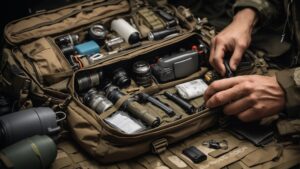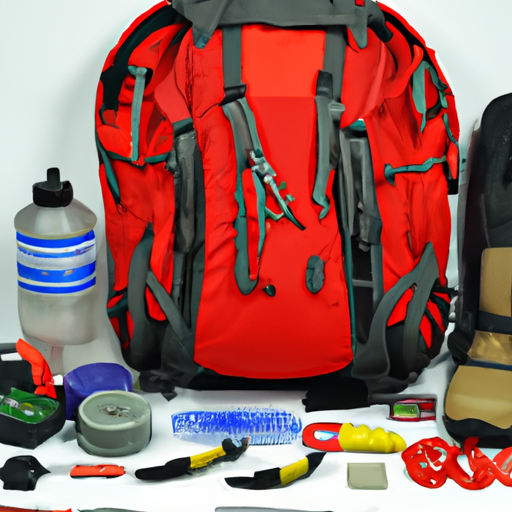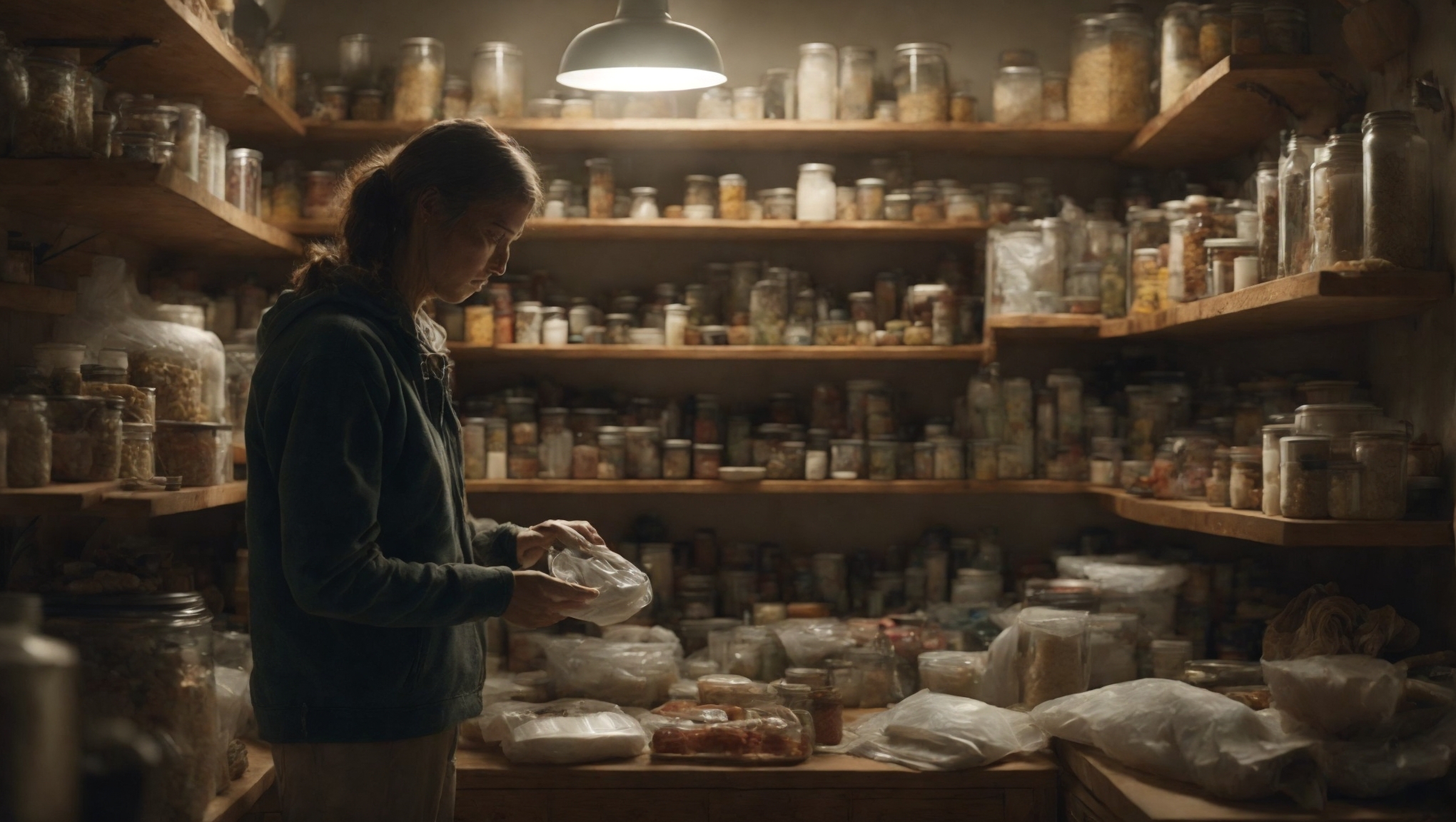Food and Water
When it comes to prepping, one of the most important things to consider is having an adequate supply of food and water. In an emergency situation, access to clean drinking water and nutritious food may be limited, so it’s crucial to stock up on non-perishable foods and establish a reliable water storage and purification system.Non-perishable foods
When selecting non-perishable foods for your prepping supply, focus on items that have a long shelf life and require minimal preparation. Canned goods, such as beans, vegetables, and meats, are excellent choices because they can be stored for an extended period and provide essential nutrients. Other options include dried fruits, granola bars, peanut butter, and powdered milk. Remember to rotate your food supply regularly to ensure freshness and prevent waste.Water storage
Having a sufficient supply of clean drinking water is paramount in any emergency. Aim to store at least one gallon of water per person per day for a minimum of three days. This water can be stored in clean, airtight containers and kept in a cool, dark place. Consider investing in water storage solutions such as water storage barrels or water pouches, which are specifically designed for long-term storage. It’s also a good idea to have a water purification system in place to ensure you have access to safe drinking water when your stored supply runs out.Water purification
While having a stockpile of stored water is essential, it may not be enough to sustain you during an extended emergency. That’s why it’s crucial to have a water purification system on hand. There are various methods to purify water, including boiling, chemical treatment, and using portable water filters. Boiling water for at least one minute can kill most types of pathogens, while chemical treatments, such as iodine tablets or chlorine bleach, effectively disinfect water. Portable filters, like those with activated carbon or ceramic filters, can remove impurities and make water safe to drink. Having multiple options for water purification ensures you can adapt to different situations and sources of water.First Aid
In any emergency scenario, injuries and medical emergencies are a genuine concern. That’s why having a well-equipped first aid kit and the knowledge to provide basic medical care is crucial.Bandages and dressings
When assembling your first aid kit, it’s essential to include a variety of bandages and dressings to handle different types of wounds. Adhesive bandages, such as sterile adhesive strips and butterfly closures, are perfect for minor cuts and scrapes. For larger wounds, sterile gauze pads, adhesive tape, and elastic bandages are ideal for securing dressings and applying pressure. Don’t forget to include antiseptic wipes or solutions to clean wounds before dressing them.Antibiotics and painkillers
In an emergency situation where medical attention may be limited, having antibiotics and painkillers in your first aid kit can be a game-changer. Antibiotics, such as broad-spectrum antibiotics, can help prevent or treat possible infections. Over-the-counter painkillers like acetaminophen or ibuprofen can provide relief from pain, fever, and inflammation. Remember to consult a healthcare professional and follow proper dosage guidelines when using these medications.First aid manual
Even if you have all the necessary supplies, it’s essential to have the knowledge and skills to administer basic first aid. Including a comprehensive first aid manual in your kit can provide guidance and step-by-step instructions for dealing with a wide range of medical emergencies. Familiarize yourself with the manual and practice basic first aid techniques, such as CPR and wound care, to ensure you can respond effectively in a crisis. Visit Here For More
Visit Here For More
Shelter and Clothing
In an emergency situation, having a safe and comfortable shelter is crucial for your well-being. Additionally, proper clothing and blankets are essential for keeping warm and protecting yourself from the elements.Tents and sleeping bags
Investing in a sturdy tent and high-quality sleeping bags should be a priority when prepping for emergencies. These items not only provide shelter but also offer insulation and protection from wind, rain, and cold temperatures. Look for tents that are easy to set up and durable enough to withstand harsh conditions. Sleeping bags with proper insulation and a temperature rating suitable for the climate in your area are also vital for a good night’s sleep.Warm clothing and blankets
When emergencies occur, weather conditions can quickly become unpredictable and harsh. It’s important to have warm and durable clothing readily available in your prepping supplies. Layered clothing, including thermal underwear, fleece jackets, and waterproof outerwear, can help regulate body temperature and protect against hypothermia. Additionally, having extra blankets and thermal emergency blankets is crucial for keeping warm, especially if you are unable to heat your shelter.Tarps and ropes
Tarps and ropes are versatile tools that can be used for various purposes in emergency situations. They can provide additional shelter, create makeshift waterproof barriers, or be used for carrying or securing items. Look for tarps made of durable materials, such as heavy-duty polyethylene, and include a selection of sturdy ropes or cords in different lengths and thicknesses. These items can be invaluable for improvising and adapting to different shelter and storage needs.Lighting and Communication
During emergencies, access to reliable lighting and communication tools can make all the difference in staying safe and connected with others.Flashlights and batteries
Having flashlights readily available is essential for navigating in the dark and illuminating your surroundings. Opt for LED flashlights, as they are energy-efficient and provide brighter light. Make sure to stock up on extra batteries in different sizes and check them regularly to ensure they are still functional. It’s also a good idea to have a battery-powered lantern for larger areas or extended periods without electricity.Portable radios
In emergencies, having access to information and updates is crucial for making informed decisions. Portable radios that can receive AM, FM, and weather bands are essential for staying tuned in to emergency alerts, weather forecasts, and news updates. Look for models with multiple power sources, such as solar, hand-crank, and battery-powered options, to ensure you can still receive important information even during power outages.Emergency whistles
In situations where communication may be difficult or dangerous, an emergency whistle can be a lifesaver. Whistles can be heard over long distances and can help attract attention if you’re lost, trapped, or in need of assistance. Keep multiple whistles in your prepping supplies, distribute them among family members, and ensure everyone knows how to use them properly.
Tools and Equipment
Having the right tools and equipment is essential for handling various tasks and challenges that may arise in emergency situations.Multi-purpose knife
A multi-purpose knife is a versatile tool that can help you with a wide range of tasks, such as cutting rope, opening packages, or preparing food. Look for a high-quality knife with a strong, sharp blade and features like a built-in can opener or screwdriver. Make sure to keep it safely stored in your prepping supplies and practice proper knife safety and maintenance.Firestarter
The ability to start a fire can be a crucial skill in emergency situations, providing warmth, light, and the means to cook food. While matches and lighters are convenient, they may not be reliable in all conditions. Including a reliable firestarter, such as a magnesium fire starter or waterproof matches, can ensure you have a dependable way to start a fire, even in wet or windy conditions.Compass and map
In emergencies, knowing your location and being able to navigate effectively can be essential for survival. Keep a compass and a detailed map of your area in your prepping supplies. Learn how to use a compass and read maps, so you can accurately determine your position and find your way to safety if necessary. Remember to keep the map updated and consider laminating it or keeping it in a waterproof container to protect it from damage.Hygiene and Sanitation
Maintaining proper hygiene and sanitation practices is crucial for preventing the spread of diseases and infections during emergencies.Toilet paper and wet wipes
Access to sanitation facilities may be limited or unavailable in emergency situations, making it essential to have alternative hygiene supplies. Stock up on toilet paper and wet wipes to ensure you can maintain personal hygiene and cleanliness. Choose biodegradable wet wipes when possible, as they are more environmentally friendly.Hand sanitizer
Hand sanitizer is a vital item to have in your prepping supplies. It can help kill germs and bacteria when access to soap and water is limited. Look for hand sanitizers with at least 60% alcohol content, and consider having multiple small bottles or travel-sized containers for easy portability.Trash bags
Proper waste disposal is essential for maintaining hygiene and preventing the spread of diseases. Include a supply of sturdy trash bags in your prepping kit to dispose of waste safely and cleanly. These bags can also be used for storage, makeshift shelters, or protecting items from the elements.Personal Protection
In emergency situations, personal protection becomes paramount to ensure your safety and well-being.Face masks
Face masks have become an essential item in our daily lives, and their importance in emergency situations cannot be overstated. In situations where the air quality is poor or when dealing with contagious diseases, wearing a face mask can help filter out harmful particles and reduce the risk of respiratory illnesses. Keep a supply of N95 or surgical masks in your prepping gear to ensure you and your loved ones are protected.Gloves
Protecting your hands is crucial in emergency situations, whether it’s from hazardous materials, infections, or extreme weather conditions. Keep a supply of nitrile or latex gloves in your prepping supplies to provide a barrier between your hands and potentially harmful substances. Gloves also come in handy when performing first aid or handling dirty or contaminated items.Pepper spray
While we hope to never find ourselves in a situation where personal safety is at risk, it’s essential to be prepared. Pepper spray is a non-lethal self-defense tool that can provide a means to deter or disable an attacker and create an opportunity to escape. Make sure to familiarize yourself with local laws and regulations regarding the use and possession of pepper spray and practice using it safely and effectively.Fuel and Energy
In emergency situations, having access to fuel and alternative energy sources can be vital for cooking, heating, and powering essential devices.Gasoline or propane
If you have access to a portable stove or generator, ensure you have an adequate supply of fuel such as gasoline or propane. These fuels can be used for cooking, heating, and powering essential appliances or tools. Store fuel in approved containers and follow proper safety guidelines for storage and handling.Battery charger
In emergencies, keeping your essential electronic devices, such as cell phones, radios, or flashlights, powered can be crucial for communication and accessing important information. Including a battery charger in your prepping supplies will allow you to recharge your devices using AA or AAA batteries. Look for chargers that can handle different battery sizes and have multiple charging options, such as solar or USB.Solar power generator
For more long-term emergency situations or if you require a significant power supply, investing in a solar power generator can be a wise choice. Solar power generators harness the energy from the sun and store it in batteries, providing a reliable and renewable energy source. They can power small appliances, charge electronic devices, and even provide energy for medical equipment. Research and select a solar power generator that suits your needs and ensure you have enough solar panels and batteries for adequate power storage.
Extra Cash and Documents
During emergencies, having extra cash and important documents readily available can provide peace of mind and facilitate essential transactions or communications.Emergency cash
In situations where power outages or communication disruptions occur, having extra cash on hand can be invaluable. ATMs may be inaccessible or out of service, and electronic payment systems may not function reliably. Keep a supply of small bills and coins in a secure location within your prepping supplies, ensuring you have enough to cover essential expenses.Identification documents and copies
Having your identification documents readily accessible is vital in emergency situations. These documents include passports, driver’s licenses, birth certificates, and any other identification cards or documents that may be necessary for identification or evacuation purposes. Make copies of these documents and store them in a separate, secure location, such as a waterproof bag or a safe deposit box.Important contact information
In emergencies, it’s crucial to have access to important contact information, including emergency hotlines, family members’ phone numbers, and essential service providers. Keep a list of these contacts in your prepping supplies, both in hard copy and digital format, and ensure you have a means to access the digital version, such as on a smartphone or a portable device.What Supplies Should I Have to Stay Safe in a Disaster?
When preparing for a disaster, it is crucial to have the necessary supplies to ensure your safety. Some of the best ways to stay safe in a disaster include having a first-aid kit, a flashlight with extra batteries, non-perishable food, and water. Additionally, a portable phone charger, a multipurpose tool, and a supply of essential medications can prove invaluable. Stay prepared and prioritize gathering these supplies for your safety and well-being.
Entertainment and Comfort
While emergencies require careful preparation and focus on survival, it’s important not to overlook the need for entertainment and comfort during challenging times.Books and games
Including books, magazines, or board games in your prepping supplies can provide an avenue for relaxation, mental stimulation, and entertainment. Choose books or games that appeal to you or your family members’ interests and preferences. They can serve as a pleasant distraction during stressful situations, promote bonding within the family, and help pass the time when other forms of entertainment are unavailable.Comfortable seating
In emergency situations where you may spend extended periods in a limited space or on uneven terrain, having comfortable seating options becomes essential. Consider investing in portable camping chairs or foam cushions that offer support and comfort. These items can greatly enhance your comfort level and help alleviate physical discomfort during times of stress.Portable charger
In today’s digital age, having a reliable power source to keep your electronic devices charged is crucial. Including a portable charger in your prepping gear will ensure you can charge your smartphones, tablets, or other essential devices when a power source is unavailable. Look for portable chargers with high capacity and multiple charging ports to keep your devices powered for extended periods. In conclusion, emergency situations can be unpredictable and challenging, but with careful planning and the right supplies, you can be better prepared to face them. Building up a comprehensive stockpile of essential items, including food, water, first aid supplies, shelter, lighting, tools, personal protection, and entertainment, will help you navigate through emergencies with greater confidence and peace of mind. Remember to regularly rotate and replenish your supplies, stay informed about local emergency procedures, and practice emergency drills with your family to ensure everyone’s safety. Stay prepared, stay safe, and be ready for anything that comes your way. Visit Here For MoreI’m Alex, the author behind True Survivalist. As a survival enthusiast myself, I’ve created this website to serve as a valuable resource for fellow survivalists and preppers. Whether it’s understanding survival situations, emergency preparedness, or finding the right survival gear, I’ve got you covered. Through a series of informative guides, I aim to provide answers to commonly asked questions, debunk common myths, and help you avoid common mistakes. At True Survivalist, I believe in equipping you with the knowledge and tools you need to be prepared for any survival scenario. Join me on this journey of self-reliance and resilience.
